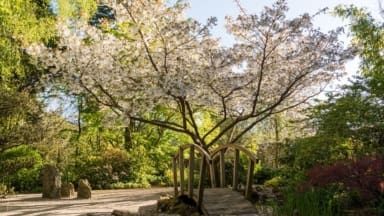
Barnsdale Gardens in Rutland, were established 40 years ago by the horticulturist and BBC Gardener’s World presenter (1983-1996), Geoff Hamilton. Following his father’s death in 1996, Nick Hamilton has been running the gardens for the last 29 years.
Committed to sustainable energy and pioneers of organic gardening, Barnsdale Gardens has served as Hamilton’s “great experiment” in sustainable growing practices. For over forty years, these techniques and principles have been the basis for Barnsdale and the gardens remain an example of organic gardening.
However, Barnsdale Gardens are concerned about the potential damage to their diverse flora and fauna from a proposed solar farm – which if goes ahead, will signal the closure of the gardens.
The proposed, 81 hectare solar farm is planned for the fields adjacent to Barnsdale. The Barnsdale team fear that the constant noise from the motorised panels tracking the sun will disrupt wildlife habitats and detract from the peaceful experience of visitors to the gardens. Additionally, standing three metres high, the solar panels would overshadow the gardens, replacing the green fields and blue sky that currently form the landscape.
Nick Hamilton, son of Geoff Hamilton and owner of Barnsdale Gardens, said: “While renewable energy is essential, it’s crucial to consider finding a more appropriate location for this solar farm. Doing so would help preserve my father’s legacy as a valuable local resource for nature and tranquility. If the solar farm does go ahead, I will have no other option than to close Barnsdale Gardens.”
Impact on Barnsdale Gardens
On being asked for more details as to the impact of the solar farm on the Barnsdale Gardens, Hamilton added:
“This proposed solar development covers 168 acres of arable fields running not just the full length of the Gardens but also beyond and as far as the eye can see. The proposal is to put 125,000 solar panels on stands across these fields in a north/south direction, with the panels being 3m (10ft) in length. They will move with the sun, during the day, so they will start the day facing the Gardens and end the day facing away from the Gardens.
“From our boundary fence the fields slopes upwards and we can see the brow of that slope across the top of our boundary hedge. Therefore the outlook from our beautiful gardens will not be of crops and blue sky but of solar panels, starting at 2m (6ft) near the hedge rising to the full 3m (10ft) on the brow of the slope. Each of these solar panel stands will have a motor to move the panels round (about 20,000 motors), so not only will our garden enhancing countryside view become that of an industrial estate the noise impact will be immense. However, before these motors would kick in and create noise virtually all day every day, we would have up to six months of machinery pile-driving the stand supports into the ground during the initial construction process.
“People come to our Gardens to enjoy their peaceful, rural setting, enjoying not just the layouts of 38 individual gardens and features, but also plants and trees in and around these gardens, as well as the bird song and the general peace and quiet that this type of visit demands.
“On top of the visual and audible devastation created we would also be impacted by more regular and more intense flooding that would undoubtedly have a very damaging impact on the Gardens from the rain that will run-off these panels. The soil in both the Gardens and all these fields is heavy, poorly drained clay and, being at the bottom of these sloping fields, in periods of heavy or prolonged rain the water will run across the surface of the fields and down to the Gardens. With, what in effect will be a virtually solid roof put over these fields this problem will cause the Gardens to flood and be unsuitable for visitors on a regular basis.
“Our little piece of paradise would not survive the six month build period, let alone 40 years of an industrial estate panoramic view and the constant noise of motors meaning our visitors would likely have to raise their voices to talk to their companions.
“We are not just a Rutland gem for the locals to enjoy but one for the whole of the UK to enjoy, as well as others from around the world. This development, if it were allowed to go ahead would bankrupt my business and destroy all the hard work both myself, my staff and my dad have put into it over 40 years.”
Hamilton is looking for public support to oppose the planning – comments for which can be submitted until the 18th of February (case reference number: 2024/1482/MAF).

